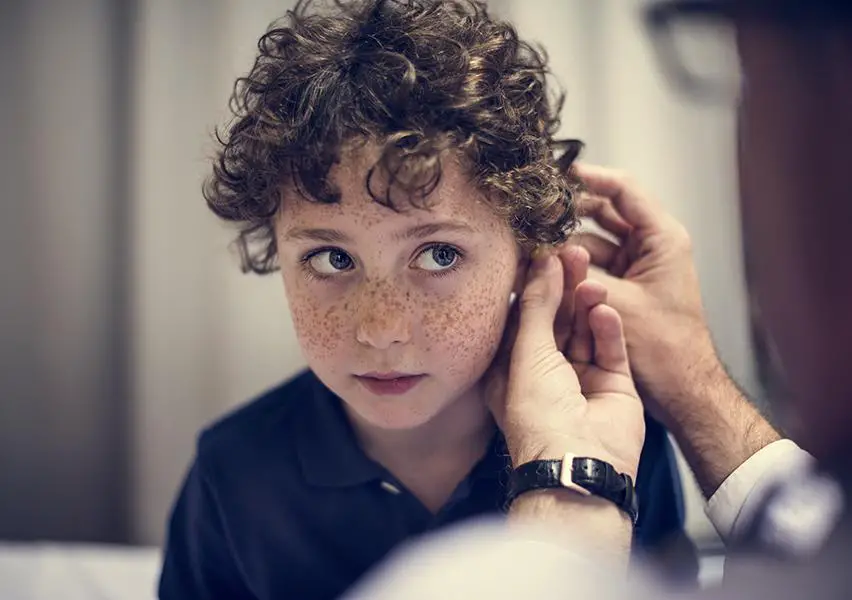Introduction
Having a child diagnosed with sensorineural hearing loss can be an overwhelming experience for any parent. You might be left with numerous questions, doubts, and worries about your child’s future. But let us reassure you, while sensorineural hearing loss is indeed a life-altering condition, it doesn’t mean life can’t be lived to the fullest.
In this comprehensive guide, we will be delving into practical strategies that can help your child, and your entire family, adapt to the realities of sensorineural hearing loss. We’ll discuss creating a hearing-loss-friendly home environment, important self-care tips, advice for traveling, coping with emotional impacts, and understanding rights at the workplace.
The journey might seem daunting, but remember, you’re not alone. There are numerous resources, professionals, and support communities ready to help. Let’s start this journey together, empowering you to support your child every step of the way.
OTC Hearing Aid Pair
Experience the world like never before with the RCA OTC Behind-the-Ear Hearing Aid. Our advanced digital technology ensures that every sound is crystal clear and vibrant, allowing you to fully immerse yourself in life’s experiences. Whether it’s the laughter of loved ones or the music that moves you, our hearing aid brings back the joy of every moment.
Say goodbye to the hassle of appointments and prescriptions. The RCA OTC Hearing Aid is designed to meet the needs of individuals without the need for a prescription. With its seamless setup and user-friendly design, you can effortlessly enhance your hearing abilities and stay connected to the world around you. Simply unpack, wear, and enjoy improved auditory perception instantly.
Experience optimal comfort and style with our discreet behind-the-ear design. The thin tube design allows you to wear glasses comfortably, so you can enjoy clear hearing while maintaining your personal sense of style. Plus, our rechargeable battery ensures long-lasting power, eliminating the inconvenience of constantly replacing small batteries. Elevate your hearing experience with the RCA OTC Hearing Aid and embrace the world with confidence.
Creating a Hearing-Loss-Friendly Home Environment
When living with sensorineural hearing loss, simple modifications to the home environment can make a significant difference. Consider installing visual alert systems for doorbells and alarms. These systems convert auditory signals into visual ones, so instead of a ring, the doorbell might flash a light.
You can also create “quiet zones” in your home, places where background noise is minimized to facilitate better communication. This can be especially beneficial during family time or when your child is doing homework or other focused activities.
Self-Care Tips for Individuals with Sensorineural Hearing Loss
Self-care is vital for everyone, but for individuals with sensorineural hearing loss, it carries added importance. It’s essential to maintain a regular sleep schedule. Lack of sleep can exacerbate feelings of fatigue often associated with hearing loss.
Your child should also learn to manage their energy levels. Listening and processing auditory information can be tiring for those with hearing loss. Therefore, encourage them to take breaks and rest when necessary to avoid exhaustion.
NAVIGATING THE DIFFERENT LEVELS OF DEAFNESS
Practical Advice for Traveling with Sensorineural Hearing Loss
Traveling with sensorineural hearing loss can seem intimidating, but it doesn’t have to be. Preparation is key. For example, when flying, notify the airline about your child’s hearing loss in advance. Airlines typically offer support for passengers with hearing loss, including priority boarding and personalized in-flight assistance.
When booking accommodations, consider options that offer visual alert systems or other hearing-loss-friendly amenities. Also, keep all hearing equipment, such as hearing aids and batteries, in your hand luggage to ensure easy access when needed.
Coping with the Emotional Impact of Sensorineural Hearing Loss
Sensorineural hearing loss can have a significant emotional impact. It’s crucial to acknowledge and address these feelings. Encourage your child to express their emotions openly. Consider seeking support from a therapist or counselor who specializes in dealing with hearing loss.
Joining a support group can also be incredibly beneficial. It allows your child to connect with others who are experiencing similar challenges. This shared understanding can be a great source of comfort and reassurance.
QUIZ - CAUSES AND THE LEVELS OF TINNITUS
Understanding Your Rights: Sensorineural Hearing Loss and the Workplace
Understanding your rights as an individual with sensorineural hearing loss is crucial, especially in the workplace. The Americans with Disabilities Act (ADA) ensures that persons with disabilities, including those with hearing loss, are protected against discrimination in all areas of public life, including jobs.
As an example, consider a scenario where a person with sensorineural hearing loss is applying for a job. Under the ADA, an employer cannot refuse to hire them solely based on their hearing loss, provided they can perform the essential job functions, with or without reasonable accommodations. These accommodations could include providing sign language interpreters or note-takers, ensuring written communication for meetings and events, or using assisted listening devices and systems.
An inspiring quote from Thomas Edison, who himself had hearing loss, puts it aptly, “I have not failed. I’ve just found 10,000 ways that won’t work.” This mindset should be applied to the workplace where your hearing loss doesn’t define your abilities or potential.
To further illustrate this, take the example of Marlee Matlin, an Academy Award-winning actress who has been deaf since she was 18 months old. Despite her hearing loss, she has had a successful career in an industry that many would assume to be reliant on the ability to hear. This shows that with the right accommodations and support, individuals with sensorineural hearing loss can excel in their chosen fields.
Your rights at the workplace extend beyond just the hiring process. Employers are required to provide a safe and accessible work environment. If a person with sensorineural hearing loss is struggling to participate in meetings or follow conversations, they can request necessary adjustments such as having meetings in a quiet, well-lit room, or having a colleague take notes that they can review later.
By understanding your rights and advocating for them, you can ensure that sensorineural hearing loss does not limit your opportunities or achievements in the workplace.
Conclusion
Living with sensorineural hearing loss brings unique challenges, but with understanding, adaptation, and support, your child can lead a fulfilling life. From creating a hearing-loss-friendly environment
at home to understanding rights at the workplace, each step taken is a step towards a more accessible world for your child.
Traveling, for instance, doesn’t have to be daunting when you plan and utilize available resources. Self-care routines and emotional support are equally crucial in navigating the day-to-day life with sensorineural hearing loss. Encouraging open conversation and seeking professional help can significantly help in managing the emotional impact of the condition.
It’s essential to understand that while sensorineural hearing loss is a lifelong condition, it doesn’t define your child’s capabilities or limit their potential. With the right support, they can navigate through their schooling, develop their career, and build meaningful relationships.
Moreover, advocating for your child’s rights in various aspects of life, including the workplace, can ensure they receive the accommodations they need. Staying informed about laws like the ADA empowers both you and your child, making it easier to advocate for necessary support.
Finally, always remember, your child’s journey with sensorineural hearing loss is not a journey they have to embark on alone. There are resources, communities, and individuals ready to offer support. With understanding, patience, and adaptability, you can help your child lead a happy, fulfilling life despite the challenges of sensorineural hearing loss.






